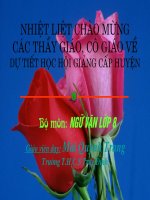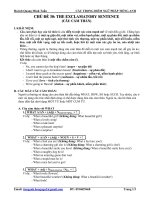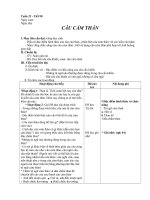câu cảm thán
Bạn đang xem bản rút gọn của tài liệu. Xem và tải ngay bản đầy đủ của tài liệu tại đây (63.33 KB, 4 trang )
♦ Exclamation (câu cảm thán)
A. GIỚI THIỆU:
Câu cảm thán là câu biểu lộ sự ngạc nhiên, sự đau đớn, sự tán thưởng, sự phàn nàn về
một người hay một vật nào đó.
What nice pictures! (Những bức tranh thật đẹp! )
How lovely the girl is! ( Cô gái đẹp làm sao! )
B. CÔNG THỨC:
Ex1: What an interesting film! ( Bộ phim thật hay! )
Ex2: How fluently Mai speaks English! (Mai nói tiếng Anh thật là lưu loát ! )
EXERCISES
I. Write exclamation, using “What + a/an + adj + Noun!”.
1. He is a good child. ......................................................................................................................
2. They are delicious cakes. ..........................................................................................................
3. It’s an interesting film. ...............................................................................................................
4. The boys are naughty. ................................................................................................................
5. The milk is fresh. ........................................................................................................................
II. Write exclamation, using “How + adj / adv + S + verb!”.
1. He has a lovely garden. .............................................................................................................
2. He swims well. ...........................................................................................................................
3. She runs fast. ...........................................................................................................................
4. The dogs are dirty.
5. This dress is cheap. ...............................................................................................................
♦ Enough: (đủ)
A. ADJECTIVE / ADVERB
adj / adv + enough + to-infinitive… ( đủ… để làm việc gì )
Ex1: He is tall enough to play volleyball. ( Cậu ấy đủ cao để chơi bóng chuyền )
Ex2: These vegetables aren’t fresh enough for us to eat them.
How + adj / adv + Subject + verb!
What + (a/an) + adj + Noun!
( Rau này không đủ sạch để chúng ta ăn )
B. NOUN
Ex: We don’t have enough time to go to the airport.
EXERCISE
I. Combine each pair of sentences into one sentence, using “adj / adv + enough + to-inf ” or
“ enough + to-inf”
Ex: He is old. He can play volleyball.
→ He is old enough to play volleyball.
1. My father is strong. He can take these suitcases home.
→ .......................................................................................................................................................
2. The weather wasn’t fine. He couldn’t go swimming.
→ .......................................................................................................................................................
3. My brother is very intelligent. He can do all exercises in the textbook.
→ .......................................................................................................................................................
4. We have money. We build a new house.
→ .......................................................................................................................................................
5. He doesn’t have any papers. He can’t finish his report.
→ .......................................................................................................................................................
6. The ice is quite thick. We can walk on it.
→ .......................................................................................................................................................
7. It isn’t warm. We can’t go out.
→ .......................................................................................................................................................
8. The ladder isn’t very long. It can’t reach the window.
→ .......................................................................................................................................................
9. He doesn’t have a reference book. He can’t read it.
→ .......................................................................................................................................................
10. We aren’t very rich. We can’t buy that expensive house.
enough + noun + to-infinitive … (đủ…. để làm việc gì)
→ .......................................................................................................................................................
♦ Responses with so, too, either, neither.
A. GIỚI THIỆU:
Dùng “so / too” khi đồng ý với ý kiến khẳng đònh.
Dùng “either / neither” khi đồng ý với ý kiến phủ đònh.
B. CÁCH DÙNG:
1. So / too: cũng vậy
a. Tobe
Ex1: A: I’m tired ( tôi mệt mỏi )
B: So am I / I am, too ( tôi cũng vậy )
Ex2: Her mother is beautiful. She is beautiful.
→ Her mother is beautiful. So is she/ she is,too ( Mẹ cô ấy đẹp, cô ấy cũng vậy )
b. Ordinary verb: động từ thường
Ex1: A: I love my parents very much. ( Tôi yêu ba mẹ tôi )
B: So do I / I do, too. ( Tôi cũng vậy )
Ex2: She ate noodles. He ate noodles
→ She ate noodles. So did he / he did, too ( Cô ấy ăn mì. Anh ấy cũng vậy )
2. Neither / Either: cũng không
a. Tobe
Ex1: The apple isn’t ripe. The banana isn’t ripe.
→ The apple isn’t ripe. Neither is the banana / The banana isn’t, either.
( Táo không chín. Chuối cũng không chín )
So + be + S
S + be +, too
So + auxiliary verbs ( do / does / did / will / can / …. ) + S
S + auxiliary verbs ( do / does / did / will / can / … ), too
Neither + be + S
S + be + not, either
Ex2: He isn’t tall. Im not tall.
→ He isn’t tall. Neither am I / I am not, either ( Anh ấy không cao. Tôi cũng không )
b. Ordinary verb: động từ thường
Ex1: We don’t like dog. He doesn’t like dog.
We don’t like dog. Neither does he/ He doesn’t, either.
( Chúng tôi không thích chó. Anh ấy cũng không thích chó )
Ex2: Nam won’t come to the party. Mai won’t come to the party.
Nam won’t come to the party. Neither will Mai/ Mai won’t, either.
( Nam sẽ không đến bữa tiệc. Mai cũng không )
EXERCISES
I. Fill in the blank with so, too / either, neither.
1. He can’t swim. ____________ can I.
2. Nam and Ba are playing soccer and _____________ is Minh.
3. Hoa doesn’t like pork and her uncle doesn’t ______________.
4. Marry drank too much beer last night and I did, _____________.
5. Jane loves dog and she loves cats, ______________.
II. Combine sentences, using either, neither / so, too.
1. They can play volleyball. We can play volleyball.
.........................................................................................................................................................
2. She is learning English. He is learning English.
.........................................................................................................................................................
3. I didn’t meet her last night. We didn’t meet her last night.
.........................................................................................................................................................
4. They mustn’t stay up late. You mustn’t stay up late.
.........................................................................................................................................................
5. She writes diary every night. Her sister writes diary every night.
.........................................................................................................................................................
6. He isn’t well. His brother isn’t well.
.........................................................................................................................................................
Neither + auxiliary verbs (do / does / did / can / will,….) + S
S + auxiliary verbs + not (don’t / doesn’t / didn’t / won’t,…), either









